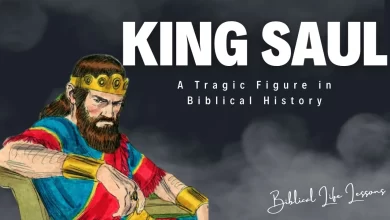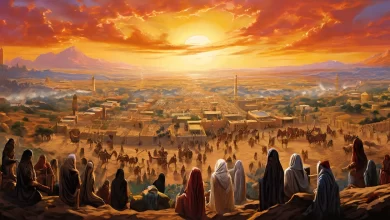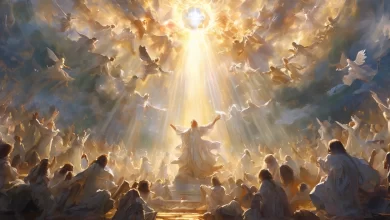
Judgment Day
The day Jezebel died was a day that echoed throughout the region of Jezreel, marking the end of an era of idolatry and corruption. Jezebel, an infamous queen, had become the ultimate symbol of rebellion against God. Her evil influence had extended for decades, but now, divine judgment was about to be executed. This chapter delves into the tense atmosphere that hung over Jezreel on that fateful day. The once vibrant city now seemed enveloped in a heavy silence, as if nature itself knew that something great and terrible was about to happen. The people, tired of years of oppression and idolatry, waited in silence as the heavens seemed to darken, announcing the arrival of Jehu, God’s instrument for bringing justice.

The Rise of Jezebel and Baal Worship
Jezebel was no ordinary woman. The daughter of a Phoenician king, she brought with her to Israel not only her culture but also her devotion to Baal, the Canaanite god of fertility and storms. Her marriage to Ahab was more than a political alliance; it was a spiritual invasion. Jezebel used her influence to build temples to Baal, persecute God’s prophets, and install idolatrous priests. This chapter explores how she manipulated Ahab into a weak and compliant king while she ruled behind the scenes. Her devotion to Baal was not only religious but also political, a way to consolidate her power and silence any opposition. Baal worship spread like wildfire, corrupting not only the court but also the hearts of the people.

The Crime of Naboth and the Curse of Elijah
The story of Naboth is one of the darkest episodes of Jezebel’s reign. Naboth, a simple and righteous man, owned a vineyard that bordered Ahab’s palace. The king, driven by a whim, wanted to turn the vineyard into a vegetable garden. When Naboth refused to sell his family inheritance, Ahab fell into despair. It was then that Jezebel entered the scene, hatching a diabolical plan. She forged letters in the king’s name, accusing Naboth of blasphemy and treason. Two false witnesses were arranged, and Naboth was stoned to death. This chapter details Jezebel’s calculating cruelty and the curse that the prophet Elijah placed on her and her family, announcing that Naboth’s blood would be avenged.

Jehu’s Revenge
Jehu was no ordinary man. Anointed by God through the prophet Elisha, he was chosen to be the executor of divine justice. His mission was clear: to end the dynasty of Ahab and purify Israel from idolatry. This chapter describes Jehu’s rise to power, his courage in confronting Jehoram, son of Jezebel, and his relentless determination to carry out God’s will. The scene in which Jehu enters Jezreel, mounted on his horse and surrounded by his soldiers, is charged with tension and anticipation. He was not just a general; he was God’s right-hand man, ready to bring judgment on those who had corrupted the nation.

Jezebel’s Last Stand
Knowing that Jehu was on his way, Jezebel did not hide. Instead, she chose to confront him with all the pomp and arrogance that characterized her life. This chapter explores Jezebel’s final moments as she prepared for the final confrontation. She painted her face, donned her finest clothes, and positioned herself at a high window where she could be seen by all. Her posture was one of defiance, as if she believed that her royal majesty would save her. She shouted at Jehu, reminding him of Zimri, a usurper who had failed. But Jehu was undeterred. He knew he was on a divine mission, and no threat or provocation could stop him.

The Death of Jezebel
Jezebel’s end was as dramatic as her life. When Jehu ordered his servants to throw her out of the window, they obeyed without hesitation. Jezebel fell from a considerable height, and her body was trampled by Jehu’s horses. The dogs, hungry predators, completed the job, devouring her body until almost nothing was left. This chapter details the final humiliation of Jezebel, whose pride and cruelty led her to an ignominious end. Elijah’s prophecy was fulfilled to the letter: the dogs licked up her blood, and there was no burial for her. Her death serves as a powerful reminder that pride comes before a fall and that divine justice cannot be avoided.
Jezebel’s Legacy
The story of Jezebel is not just a historical account; it is a timeless lesson about the dangers of idolatry, abuse of power, and rebellion against God. This chapter reflects on the lasting impact of her actions and how her name became synonymous with evil and seduction. Jezebel is often cited in Scripture as an example of what happens when someone turns away from God and pursues their own selfish desires. Her legacy is a warning to us all: power, when used for evil, leads to destruction. But it is also a story of hope, showing that God is just and that, in the end, good prevails.
A Prayer for Justice and Faith
Almighty Lord, may the story of Jezebel teach us to value justice, humility, and faith. May we use our power and influence to promote good and not evil. Strengthen us in times of adversity and always remind us that You are sovereign. In Jesus’ name, amen.
If this content touched your heart, please leave a comment. Together, we can spread God’s word and inspire more people to seek truth and justice. Thank you for being here, and may God bless you abundantly!



